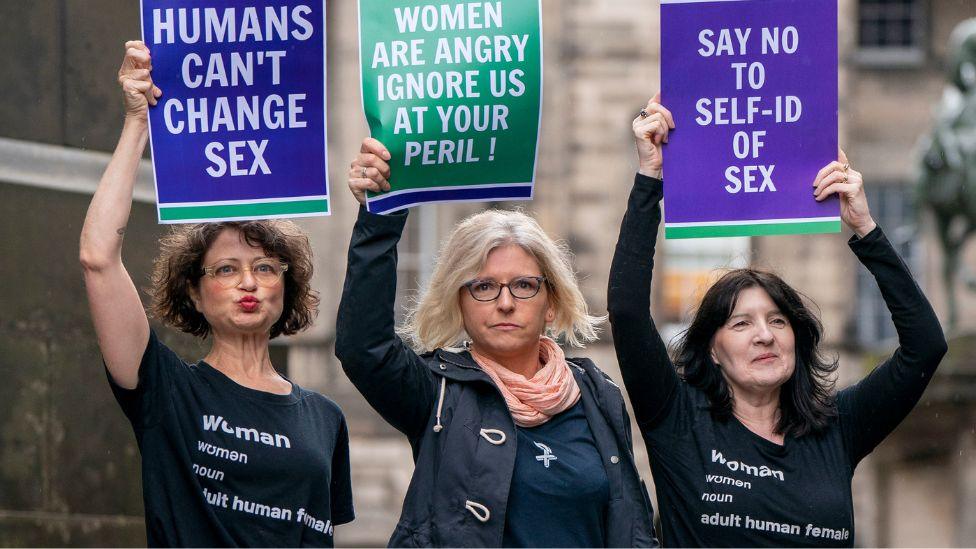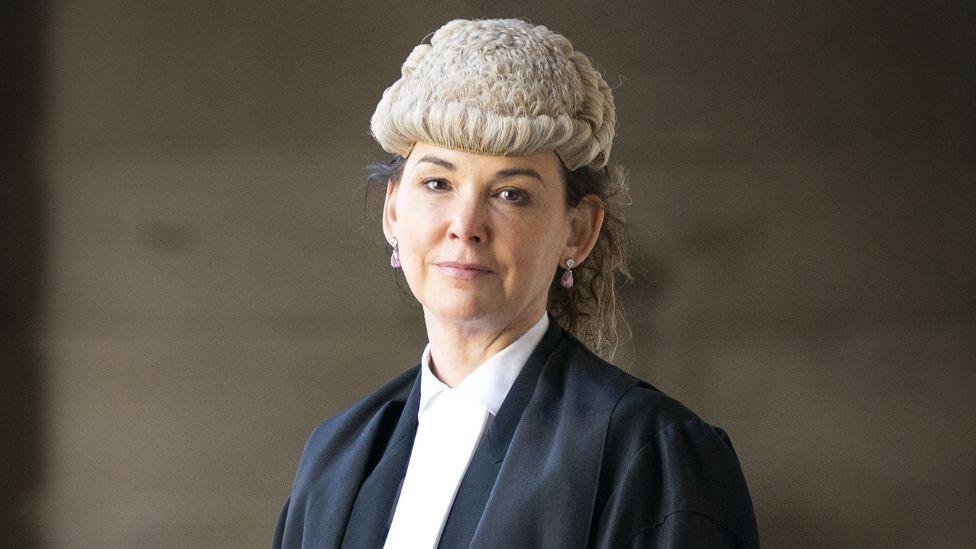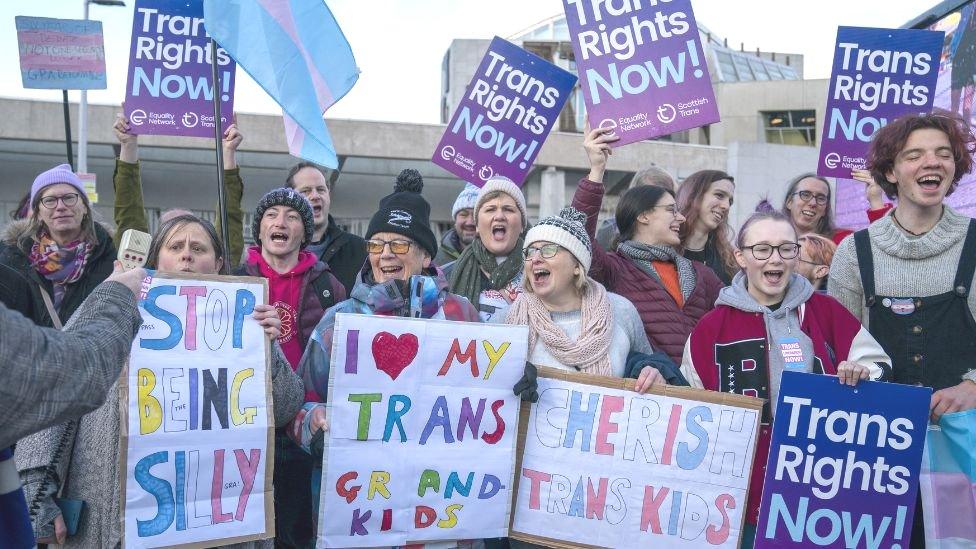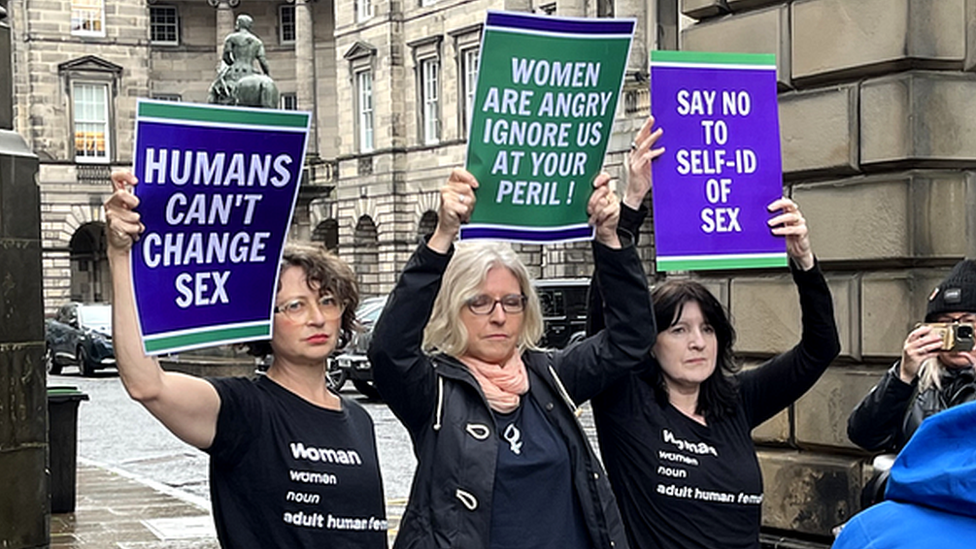UK government defends veto on Scots gender law
- Published

A small protest against the gender recognition reforms was held outside the Court of Session
The UK government's decision to block Holyrood gender recognition reforms was in "no way unconstitutional", a judge has heard.
David Johnston KC, acting for UK ministers, said it did not violate nor "rub against" any constitutional principles and was lawful.
Scottish ministers are aiming to overturn the decision at the Court of Session in Edinburgh.
Lord Advocate Dorothy Bain said the veto was unlawful and irrational.
Judge Lady Haldane has now retired to consider the evidence and will issue a written ruling.
On Tuesday, Ms Bain told the court it had a "constitutional duty" to review the unprecedented use of Section 35 of the Scotland Act, external to prevent the Gender Recognition Reform (Scotland) Bill from receiving royal assent.
The bill, which would allow people in Scotland to self-identify their sex, would see applications for a gender recognition certificate handled by Scottish registrars rather than a UK panel and would remove the need to obtain medical reports with a formal diagnosis of gender dysphoria.
Scotland Secretary Alister Jack has raised concerns that it would affect the 2010 Equality Act, which applies in Scotland, England and Wales.
Ms Bain said the reasons given by the UK government for using the Section 35 Order did not meet the criteria set out in the Scotland Act.
Citing the wording of the act, she said Mr Jack did not have "reasonable grounds" to believe that the bill would have "adverse effects on the operation of the law it applies to reserved matters".

The case is being heard at the Court of Session in Edinburgh
The UK government has argued it is "highly problematic" to have two different gender recognition systems within the UK.
It cited several potential issues, including with single-sex organisations, schools and tax rules. Such arguments have been contested by the Scottish government.
Mr Johnston denied the use of the Section 35 Order was unconstitutional.
"It is part of the very structure of devolution under the Scotland Act," he told the court.
He described the Scottish government contention that the order was linked to a policy disagreement as a "red herring" and "irrelevant".

Lord Advocate Dorothy Bain KC says the use of the Section 35 Order was unlawful
Mr Johnston said it was not Mr Jack's "duty" to scrutinise the bill as MSPs do, but to "protect the interests of the United Kingdom if he identifies adverse effects on the operation of law as it applies to reserved matters".
The KC challenged the argument that the Scotland secretary did not have "reasonable grounds" for making the order. He insisted Mr Jack took account of "a range of different views in detailed evidence".
"The steps that were taken were sufficient and they were on any view rational to justify making this order," he told the court.
He denied that Mr Jack's reasoning was "hypothetical and speculative", instead describing it as "predictive judgement" to assess how the bill would be likely to impact the operation of reserved law.
Responding to the argument that a Section 35 Order is a "broad and unfettered power", Mr Johnston agreed it was broad but said it was "far from unfettered".
The KC said it can only be exercised when statutory preconditions are satisfied, and the UK government is subject to oversight from the court, which has "rationality" as its "touchstone".
In its evidence, the Scottish government pointed to various other countries with self-identification schemes, claiming they have not suffered "adverse effects".
But Mr Johnston told the court that evidence was of "very limited assistance" to the court and to the Scotland secretary when he made his decision, and was not relevant to the principle concern.
The UK government's objections to the reforms are largely based on concerns about how the 2004 Gender Recognition Act - which set up the certification process which is being reformed - interacts with the 2010 Equality Act.
Mr Johnston said only from an "unduly narrow formalistic view" could it be considered that the Scottish government's bill does not change the operation of the Equality Act.
He told the court the only way to change legal sex for the purpose of the 2010 act is the through the mechanisms set up in the 2004 act.


David Johnston has spent a good part of his time knocking down the arguments advanced by the Lord Advocate for the Scottish government yesterday.
But he has also set out the key pillars of the UK government's case.
The first is that this is simply part of the devolution settlement - ministers in Edinburgh may not like it, but the power of veto was written into the Scotland Act from day one.
And the second is that Alister Jack had "reasonable grounds" to use the veto power, because he believes the Holyrood reforms will cut across reserved law.
Mr Johnston says it's "quite simple" to draw a line from the Scottish bill through the 2004 Gender Recognition Act and on to the 2010 Equality Act - the latter of which MSPs are not allowed to modify. The Lord Advocate would, of course, disagree.
How successful those arguments are will be a matter for the judge, Lady Haldane - but it may be some weeks or months before we find out.

On Tuesday, Ms Bain told the court that a Section 35 Order was designed to be "narrowly construed" and "tightly controlled" and should only be used in very specific circumstances as a "last resort".
She argued that because the bill only changed the process for getting a gender recognition certificate, not the actual effect of the certificate itself, there was no impact on equality laws.
And the Lord Advocate said assertions that the bill would have "adverse effects" on reserved matters were "either unfounded, too speculative or hypothetical or insufficiently cogent and material to justify the exceptional step of making the order".
'Credible evidence'
She accused Mr Jack of presenting a "partisan" case against the reforms, ignoring arguments in favour of them and failing to take "reasonable steps" to understand relevant information.
Concerns about divergence between Scottish law and laws in other parts of the UK were described as irrelevant, with Mr Jack's argument characterised as irrational.
Fears that the legislation would lead to an increase in fraudulent applications for gender recognition certificates were also not based on "credible evidence", Ms Bain said.
After all the evidence had been presented, both sides were asked for their opinion on whether Lady Haldane should submit her written ruling before an appeal by For Women Scotland in the Inner House had concluded.
It was agreed that Lady Haldane would not wait for that case to finish and she will "cross that bridge when we come to it" if the Inner House case has knock-on effects on the Section 35 ruling. The judge said in that scenario she would be prepared to allow both the UK and Scottish governments to make further submissions to the court if necessary.
If appealed, the gender law case could be heard at the Inner House of the Court of Session before ultimately coming before the UK Supreme Court in London.
- Published19 September 2023

- Published19 September 2023

- Published8 December 2023

- Published12 April 2023
